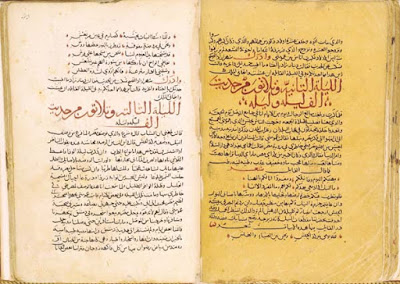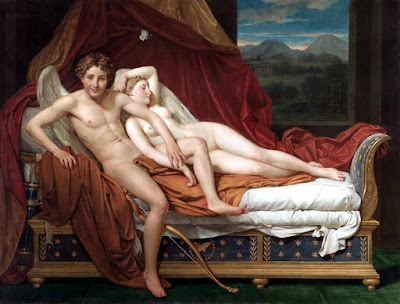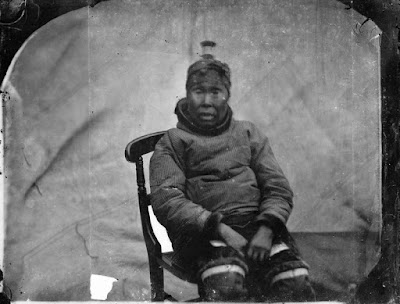Reading Notes: Arabian Nights, Part A
For this week's reading, I chose the Arabian Nights, as found in The Arabian Nights' Entertainments by Andrew Lang and illustrated by H. J. Ford (1898).
In Part A of these readings, the storyteller and daughter of the vizir, Scheherazade, risks her own life to save the lives of countless other women. She offers to become the lover of the murderous sultan Schariar, famous for killing every woman he takes after only a day. Each morning, he has his vizir kill the girl and then select a new one for him. Scheherazade decides to start telling stories to her sister, who the sultan allows to spend this last night with Scheherazade. Scheherazade tells her sister, Dinarzade, a story only to be cut off by the dawn of a new day. The sultan allows her to live in order to hear the rest of the story, thus beginning the main plot of the book: Scheherazade successfully lives day after day by telling interesting stories that intrigue the sultan, thus saving her own life and the lives of other women.
My favorite story that Scheherazade tells is the Story of the Greek King and the Physician Douban:
In this story, which is actually a story within a story (the story is being told by a fisherman to a genie in a story being told by Scheherazade to the sultan), a physician manages to cure the leprosy of a Greek king. The king is initially very grateful, and rightfully so, and rewards the physician Douban for his good work. The vizir of the king, however, becomes jealous of Douban and advises the king that the physician is plotting to assassinate him. The king tells the vizir that he knows he is only saying this because he is jealous of Douban and that the king does not believe him. The king tells a story about a man who bought a parrot in order to keep track of his wife's activities while he was gone. The parrot reported her doings to the man when he returned from his trips, getting the wife in trouble. The wife then has her servants trick the parrot into thinking there is a thunderstorm going on, which the bird then reports to the husband. The husband knows that no storm took place and, believing the parrot to be lying, kills it. He eventually finds out that the bird was telling the truth and regrets killing it.
The vizir, in turn, then tells the king a story about a prince and a vizir assigned to protect him. The vizir neglects his duties and the prince ends up lost. On his way, he finds a woman crying about how her horse left her and she is lost. He offers to giver her a ride on his and she takes him to an old building. He hears her inside telling her children that she has a juicy prince for them to eat, at which point the prince realizes that the woman is an ogress and he quickly makes his escape. The vizir is killed for having neglected his duties.
The Greek king's vizir claims that he does not want to neglect his so he insists the king have the physician executed. The king eventually relents and summons Douban and tells him he is to be killed. Douban then tells him to give him a day to get his affairs in order, that he has a book that his decapitated head will be able to instruct the king in, a book with important information. The king gives him a day, has him decapitated despite his pleas the next day, and has the head placed next to him. The head tells him to turn the pages. The king must lick his fingers to turn the pages, thus consuming the poison Douban has placed on the pages. The king dies and the head then loses life, as well, the physician having had his revenge.
For this story, I would simply like to retell it from the perspective of the vizir--perhaps he initiates the whole thing not solely out of jealousy but also out of a desire to seize the throne, knowing that the physician possesses great powers and will have his revenge on the king. Upon the deaths of both the king and the physician, the vizir is free to take the throne and rule as king, the king having had no heirs.
In Part A of these readings, the storyteller and daughter of the vizir, Scheherazade, risks her own life to save the lives of countless other women. She offers to become the lover of the murderous sultan Schariar, famous for killing every woman he takes after only a day. Each morning, he has his vizir kill the girl and then select a new one for him. Scheherazade decides to start telling stories to her sister, who the sultan allows to spend this last night with Scheherazade. Scheherazade tells her sister, Dinarzade, a story only to be cut off by the dawn of a new day. The sultan allows her to live in order to hear the rest of the story, thus beginning the main plot of the book: Scheherazade successfully lives day after day by telling interesting stories that intrigue the sultan, thus saving her own life and the lives of other women.
My favorite story that Scheherazade tells is the Story of the Greek King and the Physician Douban:
In this story, which is actually a story within a story (the story is being told by a fisherman to a genie in a story being told by Scheherazade to the sultan), a physician manages to cure the leprosy of a Greek king. The king is initially very grateful, and rightfully so, and rewards the physician Douban for his good work. The vizir of the king, however, becomes jealous of Douban and advises the king that the physician is plotting to assassinate him. The king tells the vizir that he knows he is only saying this because he is jealous of Douban and that the king does not believe him. The king tells a story about a man who bought a parrot in order to keep track of his wife's activities while he was gone. The parrot reported her doings to the man when he returned from his trips, getting the wife in trouble. The wife then has her servants trick the parrot into thinking there is a thunderstorm going on, which the bird then reports to the husband. The husband knows that no storm took place and, believing the parrot to be lying, kills it. He eventually finds out that the bird was telling the truth and regrets killing it.
The vizir, in turn, then tells the king a story about a prince and a vizir assigned to protect him. The vizir neglects his duties and the prince ends up lost. On his way, he finds a woman crying about how her horse left her and she is lost. He offers to giver her a ride on his and she takes him to an old building. He hears her inside telling her children that she has a juicy prince for them to eat, at which point the prince realizes that the woman is an ogress and he quickly makes his escape. The vizir is killed for having neglected his duties.
The Greek king's vizir claims that he does not want to neglect his so he insists the king have the physician executed. The king eventually relents and summons Douban and tells him he is to be killed. Douban then tells him to give him a day to get his affairs in order, that he has a book that his decapitated head will be able to instruct the king in, a book with important information. The king gives him a day, has him decapitated despite his pleas the next day, and has the head placed next to him. The head tells him to turn the pages. The king must lick his fingers to turn the pages, thus consuming the poison Douban has placed on the pages. The king dies and the head then loses life, as well, the physician having had his revenge.
For this story, I would simply like to retell it from the perspective of the vizir--perhaps he initiates the whole thing not solely out of jealousy but also out of a desire to seize the throne, knowing that the physician possesses great powers and will have his revenge on the king. Upon the deaths of both the king and the physician, the vizir is free to take the throne and rule as king, the king having had no heirs.
Photo of Galland manuscript, the oldest text of Arabian Nights/One Thousand and One Nights, currently at Bibliotheque Nationale in Paris. Source: Wiki Commons




Comments
Post a Comment